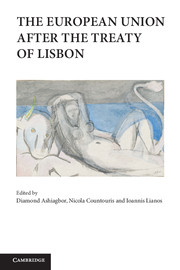Book contents
- Frontmatter
- Contents
- The European Union after the Treaty of Lisbon
- Introduction
- 1 The institutional development of the EU post-Lisbon
- 2 Competence after Lisbon
- 3 The Charter, the ECJ and national courts
- 4 Accession of the EU to the ECHR
- 5 EU citizenship after Lisbon
- 6 The law and politics of migration and asylum: The Lisbon Treaty and the EU
- 7 The European Union's common foreign and security policy after Lisbon
- 8 The European Ombudsman and good administration post-Lisbon
- 9 European contract law after Lisbon
- 10 Competition law in the European Union after the Treaty of Lisbon
- 11 The unexpected revision of the Lisbon Treaty and the establishment of a European stability mechanism
- Index
- References
9 - European contract law after Lisbon
Published online by Cambridge University Press: 05 June 2012
- Frontmatter
- Contents
- The European Union after the Treaty of Lisbon
- Introduction
- 1 The institutional development of the EU post-Lisbon
- 2 Competence after Lisbon
- 3 The Charter, the ECJ and national courts
- 4 Accession of the EU to the ECHR
- 5 EU citizenship after Lisbon
- 6 The law and politics of migration and asylum: The Lisbon Treaty and the EU
- 7 The European Union's common foreign and security policy after Lisbon
- 8 The European Ombudsman and good administration post-Lisbon
- 9 European contract law after Lisbon
- 10 Competition law in the European Union after the Treaty of Lisbon
- 11 The unexpected revision of the Lisbon Treaty and the establishment of a European stability mechanism
- Index
- References
Summary
Introduction
In December 2007, as the signatories’ ink was still drying on the Lisbon Treaty, the Draft Common Frame of Reference of European Contract Law (DCFR) was presented to the European Commission. As is examined in more detail in the following, the DCFR is the latest instrument to emerge in the EU's programme of contract law and embodies the more radical direction along which this policy area is being driven. Yet, despite the practical and conceptual significance of this document, the public debate associated with its elaboration has been remarkably muted. Such subdued public discourse can be contrasted with the political fanfare and extensive media coverage that accompanied the signing and eventual ratification of the Lisbon Treaty. Of course, it is far easier to capture the public imagination with politically visible events such as treaty reform. Moreover, the road to the Lisbon Treaty had been a particularly rocky one, the final document salvaging the EU from its constitutional discomfort following the rejection of the Constitutional Treaty. All this was to ensure that the Lisbon process remained in the public glare. European private law and the elaboration of the DCFR, in contrast, appear to be matters of far more mundane and technical concern – of interest only to scholars in the field.
Yet, one should not dismiss the construction of a European contract law as a technical project of little constitutional or political significance. As the Study Group on Social Justice reminds, the technical character often attributed to private law matters, ‘should not lead to the misapprehension that the issues posed by the construction of a European law of contract are merely technocratic, to be solved in pragmatic ways by experts’. For some time now it has been accepted that even the more ‘technical’ rules of contract law have political stakes, the nature of the rule depending on a range of ideological choices. And in this respect, we are reminded of the conceptual bridges between constitutional and private law worlds. In much the same way as a constitution, contract law can contribute to the definition of a constitutional order and capture a polity's basic rules governing social justice of the (market) order.
- Type
- Chapter
- Information
- The European Union after the Treaty of Lisbon , pp. 227 - 251Publisher: Cambridge University PressPrint publication year: 2012



